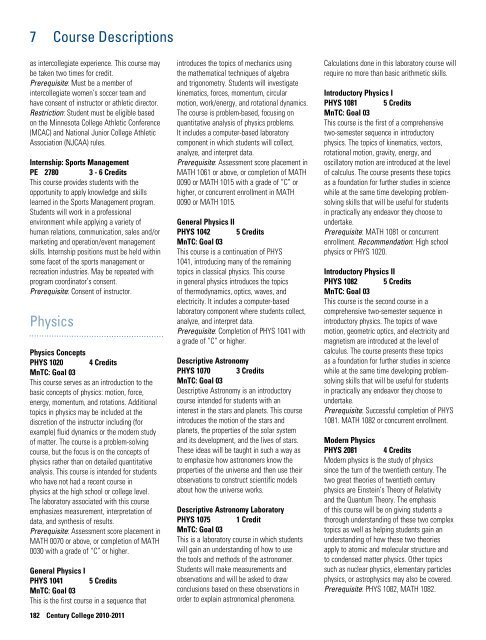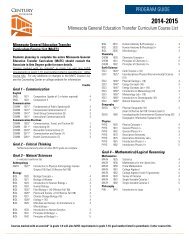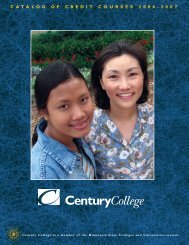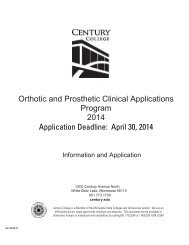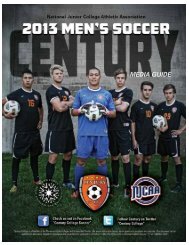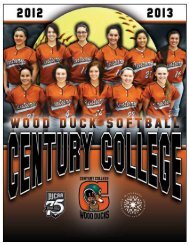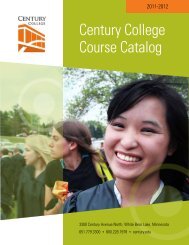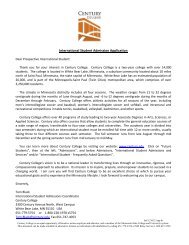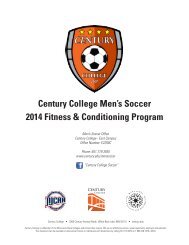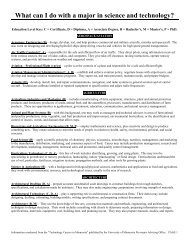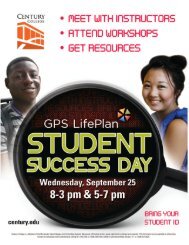2010-11 Course Catalog - Century College
2010-11 Course Catalog - Century College
2010-11 Course Catalog - Century College
Create successful ePaper yourself
Turn your PDF publications into a flip-book with our unique Google optimized e-Paper software.
7 <strong>Course</strong> Descriptionsas intercollegiate experience. This course maybe taken two times for credit.Prerequisite: Must be a member ofintercollegiate women’s soccer team andhave consent of instructor or athletic director.Restriction: Student must be eligible basedon the Minnesota <strong>College</strong> Athletic Conference(MCAC) and National Junior <strong>College</strong> AthleticAssociation (NJCAA) rules.Internship: Sports ManagementPE 2780 3 - 6 CreditsThis course provides students with theopportunity to apply knowledge and skillslearned in the Sports Management program.Students will work in a professionalenvironment while applying a variety ofhuman relations, communication, sales and/ormarketing and operation/event managementskills. Internship positions must be held withinsome facet of the sports management orrecreation industries. May be repeated withprogram coordinator’s consent.Prerequisite: Consent of instructor.PhysicsPhysics ConceptsPHYS 1020 4 CreditsMnTC: Goal 03This course serves as an introduction to thebasic concepts of physics: motion, force,energy, momentum, and rotations. Additionaltopics in physics may be included at thediscretion of the instructor including (forexample) fluid dynamics or the modern studyof matter. The course is a problem-solvingcourse, but the focus is on the concepts ofphysics rather than on detailed quantitativeanalysis. This course is intended for studentswho have not had a recent course inphysics at the high school or college level.The laboratory associated with this courseemphasizes measurement, interpretation ofdata, and synthesis of results.Prerequisite: Assessment score placement inMATH 0070 or above, or completion of MATH0030 with a grade of “C” or higher.General Physics IPHYS 1041 5 CreditsMnTC: Goal 03This is the first course in a sequence that182 <strong>Century</strong> <strong>College</strong> <strong>2010</strong>-20<strong>11</strong>introduces the topics of mechanics usingthe mathematical techniques of algebraand trigonometry. Students will investigatekinematics, forces, momentum, circularmotion, work/energy, and rotational dynamics.The course is problem-based, focusing onquantitative analysis of physics problems.It includes a computer-based laboratorycomponent in which students will collect,analyze, and interpret data.Prerequisite: Assessment score placement inMATH 1061 or above, or completion of MATH0090 or MATH 1015 with a grade of “C” orhigher, or concurrent enrollment in MATH0090 or MATH 1015.General Physics IIPHYS 1042 5 CreditsMnTC: Goal 03This course is a continuation of PHYS1041, introducing many of the remainingtopics in classical physics. This coursein general physics introduces the topicsof thermodynamics, optics, waves, andelectricity. It includes a computer-basedlaboratory component where students collect,analyze, and interpret data.Prerequisite: Completion of PHYS 1041 witha grade of “C” or higher.Descriptive AstronomyPHYS 1070 3 CreditsMnTC: Goal 03Descriptive Astronomy is an introductorycourse intended for students with aninterest in the stars and planets. This courseintroduces the motion of the stars andplanets, the properties of the solar systemand its development, and the lives of stars.These ideas will be taught in such a way asto emphasize how astronomers know theproperties of the universe and then use theirobservations to construct scientific modelsabout how the universe works.Descriptive Astronomy LaboratoryPHYS 1075 1 CreditMnTC: Goal 03This is a laboratory course in which studentswill gain an understanding of how to usethe tools and methods of the astronomer.Students will make measurements andobservations and will be asked to drawconclusions based on these observations inorder to explain astronomical phenomena.Calculations done in this laboratory course willrequire no more than basic arithmetic skills.Introductory Physics IPHYS 1081 5 CreditsMnTC: Goal 03This course is the first of a comprehensivetwo-semester sequence in introductoryphysics. The topics of kinematics, vectors,rotational motion, gravity, energy, andoscillatory motion are introduced at the levelof calculus. The course presents these topicsas a foundation for further studies in sciencewhile at the same time developing problemsolvingskills that will be useful for studentsin practically any endeavor they choose toundertake.Prerequisite: MATH 1081 or concurrentenrollment. Recommendation: High schoolphysics or PHYS 1020.Introductory Physics IIPHYS 1082 5 CreditsMnTC: Goal 03This course is the second course in acomprehensive two-semester sequence inintroductory physics. The topics of wavemotion, geometric optics, and electricity andmagnetism are introduced at the level ofcalculus. The course presents these topicsas a foundation for further studies in sciencewhile at the same time developing problemsolvingskills that will be useful for studentsin practically any endeavor they choose toundertake.Prerequisite: Successful completion of PHYS1081. MATH 1082 or concurrent enrollment.Modern PhysicsPHYS 2081 4 CreditsModern physics is the study of physicssince the turn of the twentieth century. Thetwo great theories of twentieth centuryphysics are Einstein’s Theory of Relativityand the Quantum Theory. The emphasisof this course will be on giving students athorough understanding of these two complextopics as well as helping students gain anunderstanding of how these two theoriesapply to atomic and molecular structure andto condensed matter physics. Other topicssuch as nuclear physics, elementary particlesphysics, or astrophysics may also be covered.Prerequisite: PHYS 1082, MATH 1082.


